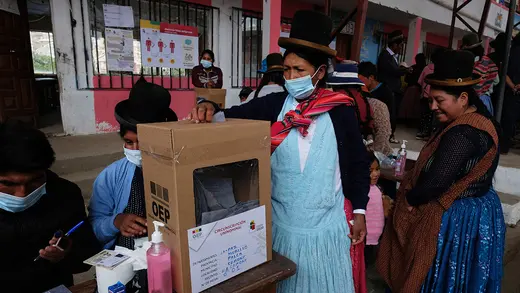Understanding Bolivia’s Election
Exit polls indicate socialist candidate Luis Arce will become Bolivia’s next president. The peaceful vote signaled an end to a year of electoral uncertainty, but the victor will now confront social upheaval and economic hardship intensified by the coronavirus pandemic.
By experts and staff
- Published
By
- Paul J. AngeloFellow for Latin America Studies
What happened in Bolivia’s October 18 presidential election?
Former finance minister Luis Arce of the leftist Movement Toward Socialism (MAS)—the party of exiled former President Evo Morales—faced off against centrist Carlos Mesa, who previously served as vice president and president of Bolivia. Right-wing candidate Luis Fernando Camacho was also in the running.
Three private exit polls indicated that Arce won enough votes to avoid a second-round runoff. According to Bolivia’s constitution, a candidate must win either a simple majority, or at least 40 percent of the vote with a 10-point lead or greater. Official results could take several days, but interim President Jeanine Anez congratulated Arce and his running mate, David Choquehuanca, for their victory just hours after the polls closed. The day after the election, Mesa conceded.
Was the election legitimate?
This election was a rerun of Bolivia’s October 2019 presidential election, which was rife with accusations of fraud. The Organization of American States (OAS) acknowledged disturbing irregularities that appeared to favor Morales, who resigned and left the country amid mass protests, political violence, and military pressure. Anez, second vice president of the nation’s Senate, was sworn in as interim president in November 2019.
Many on the left saw the appointment of conservative Anez as a coup, while many moderates and conservatives called Morales’s departure a victory for democracy. With Morales in exile in Argentina, MAS leaders accepted a new electoral timeline, setting the date for the new election in May 2020. However, the coronavirus pandemic forced postponements until October 18.

This election contrasted starkly with the one held last October. Election day was relatively peaceful, with long lines of mostly socially distanced voters waiting to cast their ballots. Rumors of voter intimidation and violence by the right abounded on social media, but actual proceedings—which were observed by a team of OAS monitors—remained calm and orderly. A peaceful election was not guaranteed; in the months prior to voting day, Bolivia experienced an uptick in political violence, with the United Nations documenting at least forty-one such acts.
Were the results unexpected?
Yes and no. Arce had consistently topped preelection polls. But for at least a month, polling indicated that neither Arce nor Mesa would score an outright victory. The most meaningful change occurred when Anez withdrew her candidacy in September, after polls had her trailing in fourth place. Since then, Arce generally polled ahead, but his initially strong margin weakened as legal charges of terrorism, terrorist financing, and sexual abuse mounted against the exiled Morales. Most watchers assumed that a second-round runoff between Arce and Mesa was all but guaranteed.
Does Arce’s win reflect Morales’s popularity?
Arce’s position as a soft-spoken, uncontroversial technocrat, combined with his championing of popular redistributive reforms, won him the election. He was not without his own bona fides: as finance minister, Arce presided over a massive reduction in poverty, even as commodity prices collapsed over the last decade. The strong victory for MAS, compared to the election of 2019, shows that it was Morales’s increasing authoritarianism and disregard for institutional checks and balances, rather than his socialist ideology, that lost him popular support last year. In addition, Anez’s divisive tenure, in which she overstepped her bounds as interim president by charting a new foreign policy and repressing her political opponents, soured many voters to a conservative turn in the country.
What’s next?
Arce’s win represents a victory for Latin America’s left, which had been forced into retreat over the past decade. Nevertheless, Bolivia’s next president will face formidable challenges: fighting the coronavirus pandemic, navigating a regional economic contraction, and healing stark social divisions. Morales, though in exile, remains a powerful figure whose influence could constrain Arce’s ability to chart his own course. With a solid majority of Bolivians behind him, Arce has a green light to preserve his mentor’s socialist policies, including redistributive economic programs aimed at reducing inequality. However, some of the MAS’s younger leaders have sought to distance themselves from Morales over his executive overreach and charges of sexual misconduct, and Arce will face pressure to bridge the dissenting views within his own party.
Even if these elections signify the end of a turbulent year in Bolivia, Arce will confront a polarized political climate, one that can only be remedied if he makes good on his promise of “governing the country for all Bolivians.”